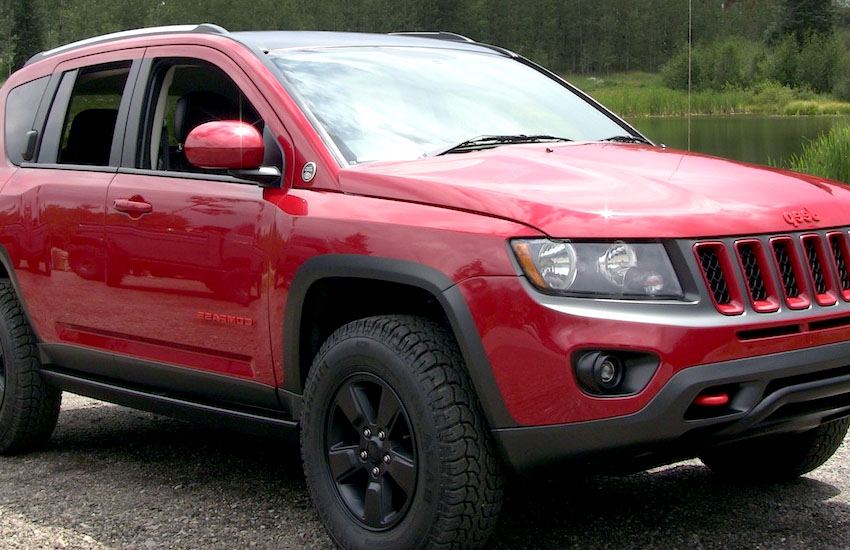If you own a 2012 Jeep Compass or are looking into it, you may have noticed that the vehicle’s battery doesn’t seem to charge when the engine is idling. This issue can be frustrating, especially when you’re trying to figure out what’s going wrong with your ride.
Is it the alternator? The battery itself? Or perhaps some other mysterious issue hiding under the hood? If you’re here, you’re probably dealing with this issue, and you’re looking for answers. Well, you’re in the right place!
In this guide, we’ll take a deep dive into the common causes of why your Jeep Compass might not be charging the battery while idling, how to troubleshoot the issue, and what you can do to fix it.

Why is Your 2012 Jeep Compass Not Charging the Battery When Idling?
To begin, it’s important to understand how your car’s charging system works. The primary component involved in charging your battery is the alternator. The alternator produces power when the engine is running, supplying electricity to various components of the car, including the battery. Normally, when the engine is idling, the alternator should continue to charge the battery.
However, if you find that your Jeep Compass’s battery isn’t charging when it’s idling, this could be a sign of an issue with one of the several components involved in the charging system. There could be a problem with the alternator, the battery itself, or other parts of the electrical system.
The Alternator’s Role
The alternator is responsible for generating electrical energy when the engine is running. As the engine turns, the alternator uses a spinning magnet to create electricity. When the engine is idling, the alternator’s speed drops, but it should still produce enough voltage to keep the battery charged.
If the alternator is malfunctioning, it may not generate enough power to charge the battery properly when the engine is at low speeds. This could be due to several reasons, such as worn-out brushes, faulty diodes, or a broken drive belt. A failing alternator is one of the most common causes of a battery not charging when idling.
The Battery’s Role
A weak or faulty battery can also contribute to charging issues. The battery stores electrical energy and supplies it to the vehicle’s electrical components when the engine is not running. If the battery is old or damaged, it might struggle to hold a charge or may not accept power from the alternator properly. This could be why your Jeep Compass isn’t charging when it’s idling.
Electrical System Problems
Sometimes, the issue isn’t with the alternator or the battery, but with the electrical connections between these components. Loose, corroded, or damaged cables can prevent the alternator from properly charging the battery. Additionally, a malfunctioning voltage regulator can prevent the alternator from sending the proper amount of current to the battery.
Now that we’ve covered the basic components involved in charging the battery, let’s take a closer look at how to diagnose and troubleshoot the issue with your 2012 Jeep Compass.
Diagnosing the Issue: How to Identify Why Your Battery Isn’t Charging When Idling
Diagnosing the cause of your battery not charging when idling can be a bit tricky, but don’t worry—we’ve got you covered! In this section, we’ll break down the steps you can take to figure out what’s causing the problem.
Step 1: Check the Battery’s Condition
Before diving into more complex diagnostics, start by checking the condition of your car battery. An old or faulty battery might not charge properly, even when the alternator is functioning correctly. Here’s what you should look for:
- Age: If your battery is older than three to five years, it might be losing its ability to hold a charge.
- Corrosion: Look for any corrosion around the battery terminals. Corrosion can impede the flow of electrical current, preventing your alternator from properly charging the battery.
- Voltage Test: Use a multimeter to check the battery’s voltage. When the engine is off, the battery should read about 12.6 volts. When the engine is running, the voltage should be around 13.7 to 14.7 volts. If it’s lower than that, your battery may be the issue.
If you find that your battery is weak, it might be time for a replacement.
Step 2: Test the Alternator
Once you’ve ruled out the battery, it’s time to check the alternator. There are a few ways you can test the alternator’s health:
- Voltage Test: With the engine running, use your multimeter to measure the voltage across the battery terminals. If the voltage is between 13.7 and 14.7 volts, the alternator is likely working correctly. If it’s lower, your alternator may not be producing enough charge.
- Warning Lights: Check your dashboard for warning lights like the battery light or check engine light. These lights often indicate that there’s an issue with the alternator.
- Listening for Strange Noises: A failing alternator might make a whining or grinding noise. If you hear these sounds, the alternator’s bearings may be worn out.
If your alternator is failing, you’ll need to replace it to restore your car’s charging system.
Step 3: Inspect the Drive Belt
A loose or worn-out drive belt can prevent the alternator from spinning properly, which in turn can prevent it from charging the battery. Inspect the belt for any visible signs of wear or looseness. If the belt is in bad condition, replace it.
Step 4: Check the Voltage Regulator
The voltage regulator controls the amount of voltage the alternator sends to the battery. If it’s malfunctioning, it can prevent the battery from charging properly. If you suspect the voltage regulator is faulty, it’s best to have a professional mechanic test and replace it if necessary.
Step 5: Inspect the Wiring and Connections
Finally, take a look at the wiring and connections between the alternator, battery, and voltage regulator. Loose, frayed, or corroded wires can prevent the charging system from working properly. Clean any corrosion off the terminals and make sure all connections are tight.
What to Do Next: Fixing the Issue
Once you’ve identified the cause of your charging issue, the next step is to fix it. The specific repair depends on what you’ve found during your diagnostic process. Let’s break down some of the potential fixes.
Replacing the Battery
If your battery is weak or dead, replacing it is your best option. Make sure to buy a battery that matches your Jeep Compass’s specifications to ensure proper fit and performance. After replacing the battery, make sure to clear any error codes that may be stored in your car’s computer.
Replacing the Alternator
If your alternator is not producing enough charge, replacing it is the solution. Alternator replacement can be a bit tricky, so if you’re not comfortable working on your car, it might be best to take your Jeep to a mechanic. If you’re tackling it yourself, make sure to disconnect the battery first, remove the alternator, and install a new one following the manufacturer’s instructions.
Replacing the Drive Belt
If the drive belt is loose or worn out, it can be replaced relatively easily. You’ll need to locate the belt tensioner and release it to remove the old belt. Install a new belt, making sure it’s tight enough to spin the alternator properly.
Replacing the Voltage Regulator
If the voltage regulator is malfunctioning, it will need to be replaced. This can be a complex job, as the regulator is often integrated into the alternator. If you’re not experienced with electrical repairs, it’s advisable to have a professional take care of this one.
Fixing Electrical Connections
If the issue lies with corroded or loose electrical connections, you can clean and tighten the terminals yourself. Be sure to disconnect the battery before working with electrical components to avoid injury or further damage. Use a wire brush to clean off corrosion, and reconnect the terminals securely.
Preventing Future Charging Problems
Once you’ve fixed the charging issue with your 2012 Jeep Compass, it’s a good idea to take steps to prevent the problem from happening again. Regular maintenance is key to keeping your car’s electrical system running smoothly.
- Regularly check the battery: Inspect your battery for signs of wear and corrosion at least once every six months.
- Replace the alternator belt: Make sure the alternator drive belt is in good condition and properly tensioned. If you notice any signs of wear, replace it immediately.
- Check for electrical issues: Regularly inspect the battery terminals and alternator wiring to ensure everything is clean and tightly connected.
By keeping up with maintenance, you can avoid the headache of dealing with a dead battery or charging problems in the future.
I Hope This Helps You!
I hope this guide has helped you understand why your 2012 Jeep Compass might not be charging the battery when idling and how to fix it. With a little bit of troubleshooting and some basic repairs, you can get your Compass back to running smoothly.
Are These Questions in Your Mind?
If you still have some questions, don’t worry. Below are some frequently asked questions that can help clear up any remaining doubts you might have!
Is it normal for my 2012 Jeep Compass to not charge the battery while idling?
No, it’s not normal. Your alternator should be charging the battery while the engine is running, even at idle. If it’s not, there may be an issue with the alternator, battery, or electrical connections.
Can I drive my 2012 Jeep Compass if the battery isn’t charging while idling?
It’s not recommended. Driving with a battery that isn’t charging properly can leave you stranded, as your car’s electrical system will rely solely on the battery, which can quickly drain.
Do I need to replace the alternator if my Jeep Compass isn’t charging the battery at idle?
Not necessarily. Before replacing the alternator, check the battery, drive belt, and wiring connections. The issue may be something simpler, like a loose connection or a faulty battery.
Is it dangerous to drive my Jeep Compass with a battery that isn’t charging?
Yes, it can be dangerous. If your battery isn’t charging properly, you could lose power to critical systems like the headlights, radio, or even the engine itself, which can cause you to break down unexpectedly.
Can a weak battery cause charging issues in my Jeep Compass?
Yes, a weak or faulty battery can make it difficult for the alternator to properly charge the battery, especially when idling. A bad battery can also prevent the electrical system from operating efficiently.
Do I need a mechanic to fix the charging issue in my Jeep Compass?
It depends on the severity of the issue and your comfort level with car repairs. If you’re unsure or inexperienced, it’s always a good idea to take your car to a professional mechanic.
Can I test my alternator at home?
Yes, you can perform a simple voltage test with a multimeter to check if your alternator is producing enough charge. However, diagnosing more complex issues may require professional tools or expertise.
Is it possible to fix the alternator yourself?
If you’re experienced with car repairs, you can replace the alternator yourself. However, it’s a complex job, and if you’re not confident, it’s best to seek help from a professional mechanic.
Can electrical corrosion affect the charging system?
Yes, corrosion on the battery terminals or wiring connections can cause charging issues by preventing proper electrical flow. Clean any corrosion and ensure the connections are secure.
Do I need to replace the drive belt if it’s loose?
If the drive belt is loose or worn out, it’s a good idea to replace it to ensure the alternator functions properly. A worn-out belt can prevent the alternator from generating enough power to charge the battery.


